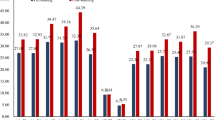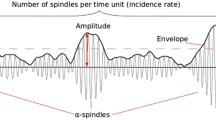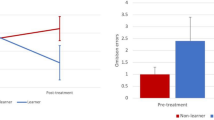Abstract
Alpha/theta neurofeedback training is supposed to enhance cognitive performance as well as alleviate psychiatric disorders. Sleep during this training is regarded a confounding factor, although it is usually not controlled. Here, the amount of sleep, the impact of sleep on frequency results and the validity of subjective judgments of having fallen asleep were investigated. 40 healthy young subjects participated in 31 training units of real or mock feedback. It turned out that stage 2 sleep occurred in 10–14 % of training time, in 95 % of the subjects and in 1/3 of all training units. Sleep significantly influenced the theta/alpha ratio and theta but not alpha amplitudes. Only about 2/3 of the subjective judgements were correct and no more than 13 % of the participants could reliably identify sleep. These data demonstrate that sleep can easily occur during alpha/theta neurofeedback training and should be controlled by objective means.

Similar content being viewed by others
References
Aftanas, L. I., & Golocheikine, S. A. (2001). Human anterior and frontal midline theta and lower alpha reflect emotionally positive state and internalized attention: High-resolution EEG investigation of meditation. Neuroscience Letters, 310(1), 57–60.
Backhaus, J., & Junghanns, K. (2006). Daytime naps improve procedural motor memory. Sleep Medicine, 7(6), 508–512.
Bodenhammer-Davis, E. (2004). Extended follow-up of pensiton protocol results with chemical dependency. Journal of Neurotherapy, 8(2), 135.
Born, J., Rasch, B., & Gais, S. (2006). Sleep to remember. Neuroscientist, 12(5), 410–424.
Breslau, N., Roth, T., Rosenthal, L., & Andreski, P. (1996). Sleep disturbance and psychiatric disorders: A longitudinal epidemiological study of young adults. Biological Psychiatry, 39(6), 411–418.
Cahn, B. R., & Polich, J. (2006). Meditation states and traits: EEG, ERP, and neuroimaging studies. Psychological Bulletin, 132(2), 180–211.
DeBeus, R., Prinzel, H., & Ryder-Cook, A. (2002). QEEG-based versus research-based EEG biofeedbacktreatment with chemically dependent outpatients: Preliminary results. Journal of Neurotherapy, 6(1), 64–66.
Egner, T., & Gruzelier, J. H. (2003). Ecological validity of neurofeedback: Modulation of slow wave EEG enhances musical performance. NeuroReport, 14(9), 1221–1224.
Egner, T., Strawson, E., & Gruzelier, J. H. (2002). EEG signature and phenomenology of alpha/theta neurofeedback training versus mock feedback. Applied Psychophysiology and Biofeedback, 27(4), 261–270.
Finkelberg, A., Sokhadze, E., Lopatin, A. A., Shubina, O., Kokorina, N. P., & Skok, A. (1996). The application of alpha-theta EEG biofeedback training for psychological improvement in the process of rehabilitation of the patients with pathological addictions. Biofeedback and Self-Regulation, 21, 364.
Gais, S., Molle, M., Helms, K., & Born, J. (2002). Learning-dependent increases in sleep spindle density. Journal of Neuroscience, 22(15), 6830–6834.
Graap, K., & Freides, D. (1998). Regarding the database for the Peniston alpha-theta EEG biofeedback protocol. Applied Psychophysiology and Biofeedback, 23(4), 256–272.
Green, E. E., & Green, A. M. (Eds.). (1977). Beyond biofeedback. San Francisco: Delacorte.
Gruzelier, J. (2009). A theory of alpha/theta neurofeedback, creative performance enhancement, long distance functional connectivity and psychological integration. Cognitive Processing, 10(Suppl 1), S101–s109.
Gruzelier, J., Egner, T., & Vernon, D. (2006). Validating the efficacy of neurofeedback for optimising performance. Progress in Brain Research, 159, 421–431.
Helmstaedter, C., Lendt, M., & Lux, S. (2001). Verbaler Lern- und Merkfähigkeitstest (VLMT). Göttingen: Beltz Test.
Hoddes, E., Dement, W. C., & Zarcone, V. (1972). The development and use of the Standford Sleepiness Scale (SSS). Psychophysiology, 10, 421–436.
Iber, C., Ancoli-Israel, S., Chesson, A., & Qand, S. F. (Eds.). (2007). The AASM manual for the scoring of sleep and associated events: Rules, terminology and technical specifications (1st ed.). Westchester, IL: American Academy of Sleep Medicine.
Kelley, M. J. (1997). Native Americans, neurofeedback, and substance abuse theory. Three year outcome of alpha/theta neurofeedback training in the treatment of problem drinking among Dine’ (Navajo) people. Journal of Neurotherapy, 2(3), 24–60.
Krauchi, K., Knoblauch, V., Wirz-Justice, A., & Cajochen, C. (2006). Challenging the sleep homeostat does not influence the thermoregulatory system in men: Evidence from a nap vs. sleep-deprivation study. American Journal of Physiology-Regulatory Integrative and Comparative Physiology, 290(4), R1052–R1061.
Lagopoulos, J., Xu, J., Rasmussen, I., Vik, A., Malhi, G. S., & Eliassen, C. F. (2009). Increased theta and alpha EEG activity during nondirective meditation. Journal of Alternative and Complementary Medicine, 15(11), 1187–1192.
Lezak, M. D. (1976). Neuropsychological assessment. New York: Oxford University Press.
Lowe, F. (1999). How essential is the EG component of the Peniston and Kulkosky protocol? Applied Psychophysiology and Biofeedback, 24(2), 1999.
Moore, J. P., Trudeau, D. L., Thuras, P. D., Rubin, Y., Stockley, H., & Dimond, T. (2000). Comparison of alpha-theta, alpha and EMG neurofeedback in the production of alpha-theta crossover and the occurrence of vizualizations. Journal of Neurotherapy, 4, 29–42.
Peniston, E. G., & Kulkosky, P. J. (1989). Alpha-theta brainwave training and beta-endorphin levels in alcoholics. Alcoholism, Clinical and Experimental Research, 13(2), 271–279.
Peniston, E. G., & Kulkosky, P. J. (1990). Alcoholic personality and alpha-theta brainwave training. Medical Psychotherapy, 3, 37–55.
Peniston, E. G., & Kulkosky, P. J. (1991). Alpha-theta brainwave neuro-feedback therapy for Vietnam veterans with combact-related post-traumatic stress discorder. Medical Psychotherapy, 4, 47–60.
Peniston, E. G., Marrinan, D. A., Deming, W. A., & Kulkosky, P. J. (1993). EEG alpha-theta brainwave synchronization in Vietnam theater veterans with combat-related post-traumatic stress disorder and alcohol abuse. Medical Psychotherapy: An International Journal, 6, 37–50.
Raymond, J., Sajid, I., Parkinson, L. A., & Gruzelier, J. H. (2005a). Biofeedback and dance performance: A preliminary investigation. Applied Psychophysiology and Biofeedback, 30(1), 64–73.
Raymond, J., Varney, C., Parkinson, L. A., & Gruzelier, J. H. (2005b). The effects of alpha/theta neurofeedback on personality and mood. Brain Research. Cognitive Brain Research, 23(2–3), 287–292.
Rechtschaffen, A., & Kales, A. (Eds.). (1968). A manual of standardized terminology, techniques, and scoring system for sleep stages of human subjects. Los Angeles: BIS/BRI University of California, Los Angeles.
Rey, A. (1958). L’examen clinique en psychologie. Paris: Press Universitaire de France.
Sanchez-Ortuno, M. M., & Edinger, J. D. (2012). Cognitive-behavioral therapy for the management of insomnia comorbid with mental disorders. Current psychiatry reports, 14(5), 519–528.
Saxby, E., & Peniston, E. G. (1995). Alpha-theta brainwave neurofeedback training: An effective treatment for male and female alcoholics with depressive symptoms. Journal of Clinical Psychology, 51(5), 685–693.
Scott, W. C., Kaiser, D., Othmer, S., & Sideroff, S. I. (2005). Effects of an EEG biofeedback protocol on a mixed substance abusing population. American Journal of Drug and Alcohol Abuse, 31(3), 455–469.
Skok, A., Shubina, O., Finkelberg, A., Shtark, M., & Jafarova, O. (1997). EEG training in the treatment of addictive disorders. Applied Psychophysiology and Biofeedback, 22(2), 127–150.
Sokhadze, T. M., Cannon, R. L., & Trudeau, D. L. (2008). EEG biofeedback as a treatment for substance use disorders: Review, rating of efficacy, and recommendations for further research. Applied Psychophysiology and Biofeedback, 33(1), 1–28.
Vernon, D., Egner, T., Cooper, N., Compton, T., Neilands, C., & Sheri, A. (2003). The effect of training distinct neurofeedback protocols on aspects of cognitive performance. International Journal of Psychophysiology, 47(1), 75–85.
Acknowledgments
This study was supported by a grant given from the German Research Foundation (DFG, Grant-No. JU 4301 1/1-1). Thanks to all participants for taking part in the neurofeedback training and special thanks to all research assistants helping in the manual data analysis.
Author information
Authors and Affiliations
Corresponding author
Rights and permissions
About this article
Cite this article
Schütze, M.D., Junghanns, K. The Difficulty of Staying Awake During Alpha/Theta Neurofeedback Training. Appl Psychophysiol Biofeedback 40, 85–94 (2015). https://doi.org/10.1007/s10484-015-9278-9
Published:
Issue Date:
DOI: https://doi.org/10.1007/s10484-015-9278-9




